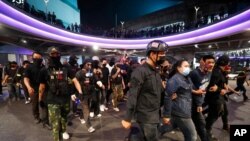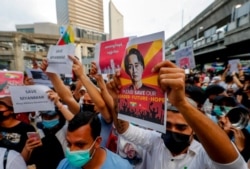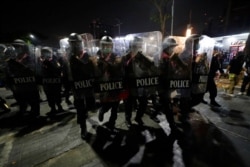Thai pro-democracy protesters returned to Bangkok’s streets Wednesday for a thunderous "pots and pans" rally against the arrest of their leaders and as an act of solidarity with mass protests against a military coup in Myanmar.
Protests in Myanmar after the February 1 military coup began with acts of civil disobedience, including the beating of pots and pans, to drive away “evil” — a custom now enacted nightly targeting the army that toppled the elected government of Aung San Suu Kyi.
Wednesday evening, thousands of Thai protesters fighting their own pro-democracy battle used the same method of dissent against a government stacked with generals that is struggling to find answers to the economic damage caused by COVID-19.
“The pots-and-pans theme is inspired by Myanmar,” said protester Napasin Treelayapewat, 16. “But it’s also a symbolic gesture from the Thai people to show that they’re starving, because pots and pans to some are tools to earn a living. And now, they have nothing left.”
Thailand and Myanmar share a long, porous frontier. Hundreds of thousands of Myanmar migrants send remittances home from jobs in the Thai kingdom, which has Southeast Asia’s second-largest economy.
Thailand’s second wave of COVID-19 was blamed on Myanmar migrants, who illegally crossed the border for work.
Political bonds
But to the defiant, Generation Z protesters in both countries, there are tight, political bonds — forged over the internet — and a shared enmity toward armies that refuse to let democracy take root.
Thailand’s pro-democracy protests began last year, calling for the resignation of the government of ex-army chief Prayuth Chan-Ocha, the drafting of a new constitution and reform of the once-untouchable monarchy.
Thailand’s military has carried out 13 coups since the kingdom became a constitutional monarchy in 1932, and only one elected civilian government has been allowed to serve its full term in the last 30 years. Prayuth carried out a coup in 2014.
Several key leaders were detained this week for defaming the army-backed monarchy — a crime punishable by up to 15 years in prison.
Protesters in downtown Bangkok carried placards reading “No 112” in reference to the criminal code provision on royal defamation.
'What about us?'
As night fell, scuffles broke out with authorities at a police station where the leaders were being held.
“The Myanmar protests have showed us how politically conscious they are,” Thai protest leader Attapon Buapat told the crowd outside the police station. “What about us? Can Thai people be as conscious as this?”
The Thai government has not condemned the coup on its borders by Senior General Min Aung Hlaing.
Instead, Prayuth on Wednesday told reporters that "Thailand supports the democratic process. The rest is up to him [Min Aung Hlaing] to see how to proceed."
In the gap between military-led governments, the neighboring protest movements have struck up an online conversation, borrowing symbols and sharing tips and support over social media.
“We were inspired to use the three-fingers salute by the Thai protests,” May, 25, a protester in Yangon, told VOA by telephone Wednesday, referring to the "Hunger Games" salute popular with Thailand’s pro-democracy movement.
Their protest reflexes — from the virtual world of memes to the use of hard hats and umbrellas against water cannons on the streets — were also honed through a hashtag (#MilkTeaAlliance) that binds Asia’s young pro-democracy movements from Hong Kong and Taiwan to Thailand and now Myanmar.
Information sharing
"We retweet each other ... and Hong Kong people share useful information: how to trend massively; how to protest and get media attention; how to use apps to avoid police tracing our conversations,” May said, giving a nickname only for security reasons.
Myanmar’s street movement flared shortly after the coup by the Tatmadaw — as Myanmar’s military is known — which swept away the landslide election victory of Suu Kyi’s National League for Democracy party (NLD).
But an unintended consequence of Myanmar’s movement is the reinvigoration of Thailand’s anti-authoritarian protesters, who are formally banned from gathering under security laws during the pandemic, and had broadly been dormant until the Myanmar coup.
"Stories, photos and footage of people standing up for their rights in Myanmar have emboldened Thailand's pro-democracy movement,” said Thai political commentator Voranai Vanijaka. “It says we are not alone in this fight."






